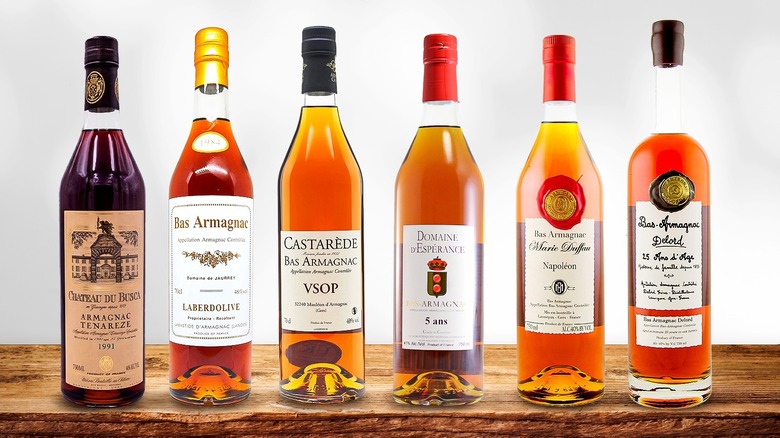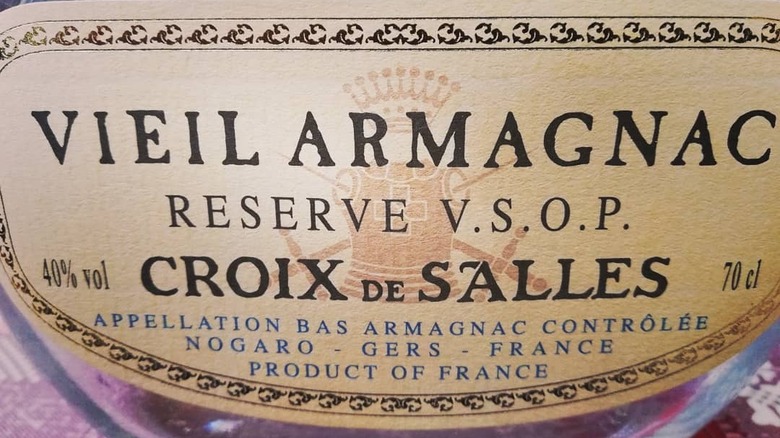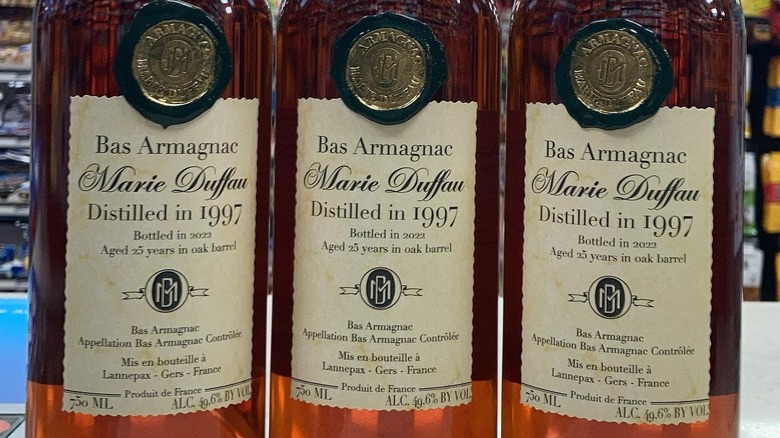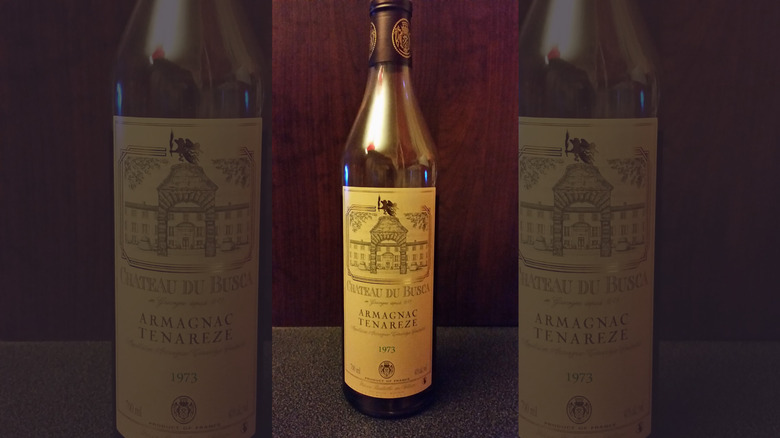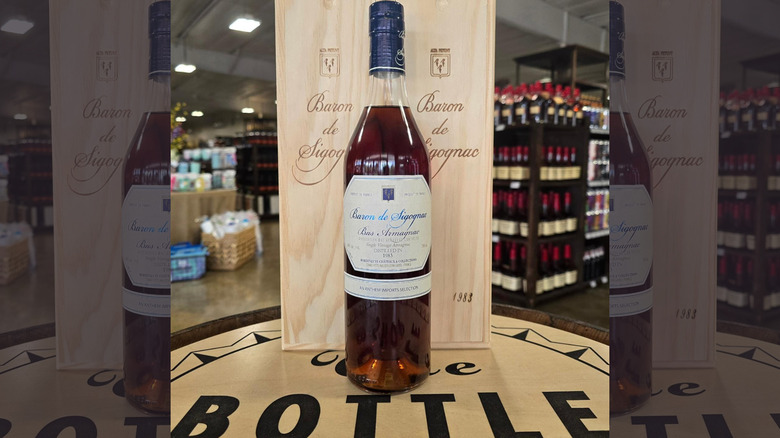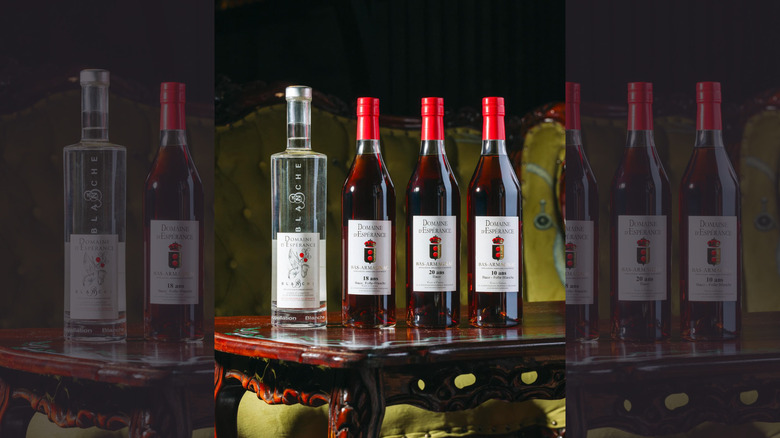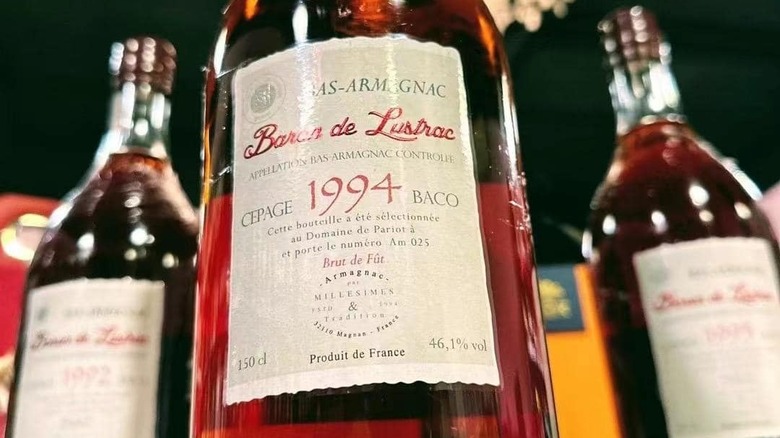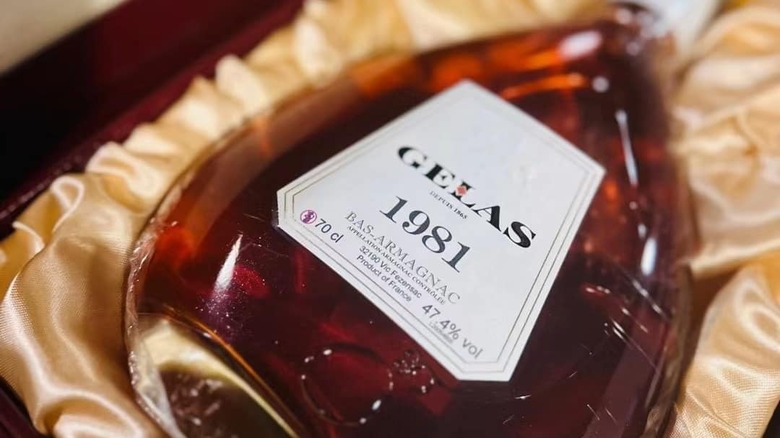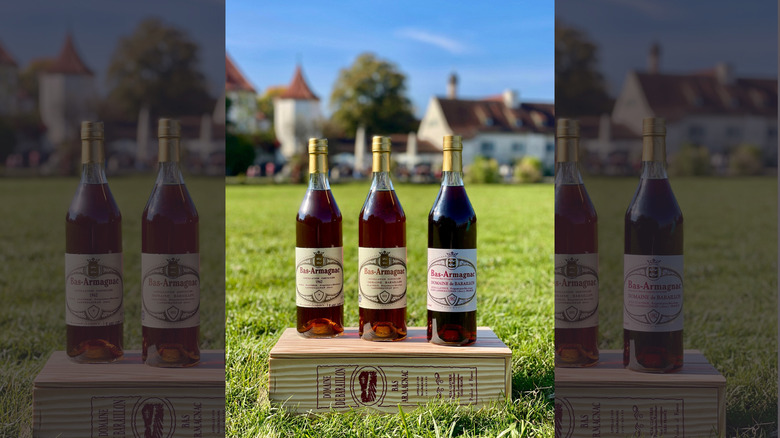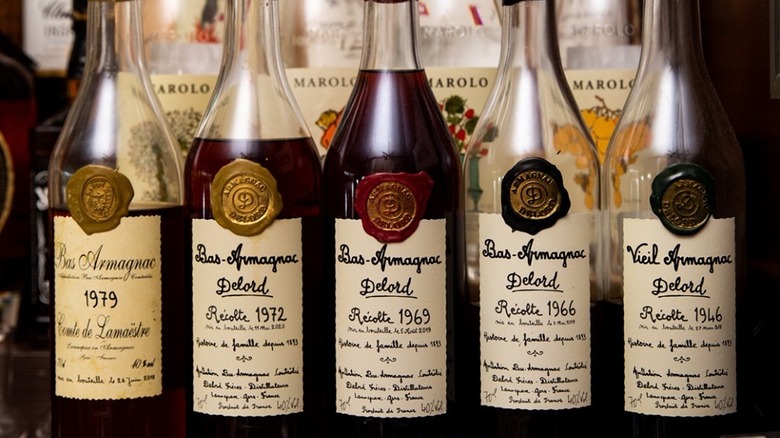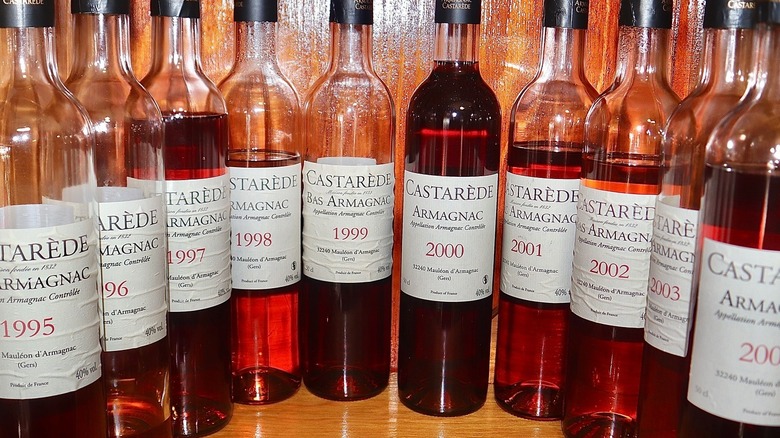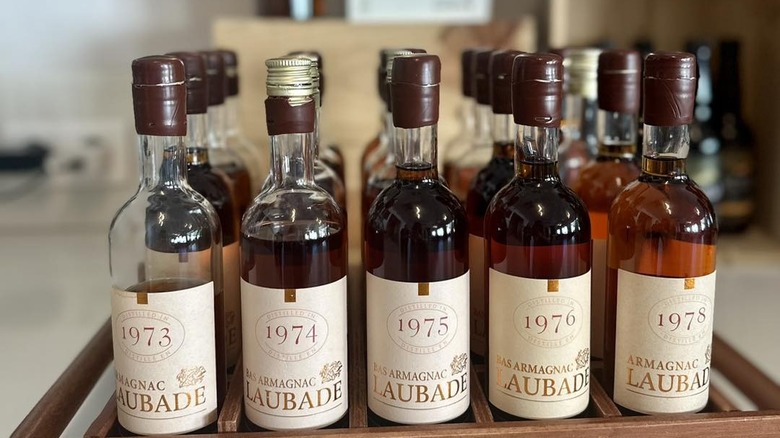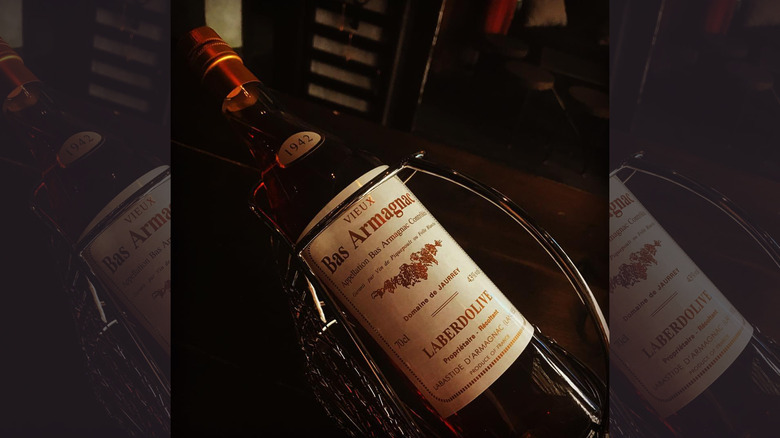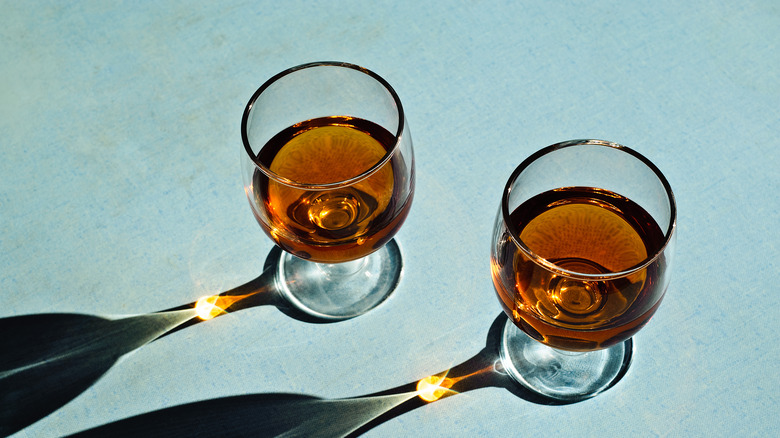12 Top Armagnac Brands, Ranked Worst To Best
When it comes to spirits, few are as diverse as brandy. Made by distilling wine or a fermented fruit mash, brandies come in a huge range of styles and flavors (depending on their base ingredients and how they're made). While the most famous type is arguably Cognac, if you want to become more familiar with brandy, it's also worth trying the French spirit's older sibling: Armagnac.
Now, despite some similarities — both have strict regulations surrounding their production and aging designations, for instance – Armagnac and Cognac are distinct styles of brandy. Armagnac can only be made in the Armagnac region within Gascony, France, and is distilled once (compared to Cognac's double distillation). Typically higher in alcohol strength than Cognac, as well, Armagnac tends to have a richer, more complex flavor profile than its brandy relative.
During my lengthy, years-long international bartending career, I've been lucky enough to sample Armagnacs from some of France's best distilleries. Consequently, I'm more than qualified to rank the best brands producing France's oldest spirit. These rankings are based on a combination of personal experience, reputation among industry professionals, and prestige among brandy connoisseurs, with accessibility and affordability factored in, as well. After all, brandy doesn't have to be rare or expensive to be delicious. Here are 12 top Armagnac brands ranked from worst to best.
12. Croix de Salles
As I mentioned above, Armagnac must be made within a specific region of France. This area is divided into three separate appellations – Bas-Armagnac, Ténarèze, and Haut Armagnac — with the first distillation house in Bas-Armagnac founded by Pascual Dartigalongue in the 19th century. After purchasing a vineyard called Lacroutz in 1870, Dartigalongue had the ability to grow his own native grapes, and launched Croix de Salles Armagnac to complement his eponymous Dartigalongue brand.
Still owned and operated by the Dartigalongue in the 21st century, the true gems of the Croix de Salles brand lie within its range of vintage bottles. These admittedly pricey expressions are made with the grapes from a single harvest — sometimes from over a century ago. The Armagnacs are aged for extraordinarily long periods of time, and each vintage varies in terms of its nuanced flavors.
Of course, while Croix de Salles offers drinkers an extremely rich, powerful, and slightly floral spirit, this somewhat rare brand is really only available to those who can afford to buy one of its extremely costly bottles. Although Croix de Salles is a great Armagnac, it's hard to rank it higher when its best bottles are so expensive overall, so it comes in last place.
11. Marie Duffau
Marie Duffau's selection of Armagnacs may not be as exclusive as some other producers, but it makes up for it in terms of quality and affordability. The brand takes its name from the wife of Prosper Delord, founder of the famed Delord Armagnac house (which we'll look at more closely later in this article). While Duffau owned a large area of vineyards in the Bas-Armagnac region when she and Delord married in the late 19th century, it wasn't until 1932 that the couple's sons formed an official Armagnac house.
Marie Duffau offers a relatively inexpensive range of Armagnacs that run from younger styles (like the VSOP bottling) to an older Napoleon style of brandy – though there are arguably better alternatives at the same price point. There's also a limited selection of full-bodied vintage Armagnacs dating back to the 1970s, which boast even deeper flavor notes and a robust barrel character.
Since even the older expressions can typically be found for less than a few hundred dollars, this Armagnac brand offers a remarkably good value given the age. Unfortunately, even when considering the extensive experience and quality of Marie Duffau, the lack of availability of the brand's premium vintages keeps it below the higher-ranked entries, so it places near the bottom.
10. Château du Busca
While many Armagnac houses are steeped in history, Château du Busca is esteemed in part due to its location. Situated within a 17th-century castle (dating back to the days of King Louis XIV), Château du Busca is the oldest distillery in the Ténarèze region of Armagnac — or rather, it was. After all, the Armagnac brand appears to have ceased operations as of late 2024. Given the uncertainty surrounding Château du Busca's future, I can't rank it any higher.
Now, while the current and future of Château du Busca is unclear, it's generally fairly easy to find a bottle of the brand's Armagnac. Château du Busca's Armagnac is also made solely with ugni blanc grapes, a style transplanted from Italy. These grapes grow extremely well in the Ténarèze terroir and are known to produce a full-bodied brandy.
Bold and smooth due to years of aging, the nutty and complex Château du Busca Armagnacs can be found in an array of vintages. The younger vintages can set you back several hundred dollars, while the older and rarer ones often come close to the four-figure mark. Of course, between the Armagnac brand's premium price and likelihood of less bottles being available over time (at a higher cost), Château du Busca comes in the bottom half.
9. Baron de Sigognac
The Baron de Sigognac brand is relatively new by Armagnac standards, having been founded by the Guasch family in 1974. But its name refers to a legend of the Armagnac annals about a nobleman who was so obsessed with the aging process of Armagnac that he had made clocks specially for his cellar to count in years and decades, rather minutes and hours. While it's unclear whether it uses such clocks, Baron de Sigognac is known to grow (and use) ugni blanc and baco grape varietals for its base wine, which is distilled in a century-old traditional column still.
Baron de Sigognac has no shortage of mature options, either, held in the section of its cellar (known as "paradise") reserved for only the oldest brandies. These reserves have allowed them to bottle vintages dating back to the late 19th century, though the brand's most mature editions can cost thousands of dollars.
Frankly, that generally high price — combined with the fact that its entry-level VS and VSOP bottles are rather underwhelming — holds this Armagnac brand back. The XO expression and younger vintages are still reasonably priced and showcase a delectably fruity and buttery character, as well, so it certainly belongs on this list — but not above the higher ranked entries.
8. Domaine d'Esperance
Domaine d'Esperance is another brand that's comparatively new in Armagnac terms. It was launched in 1990 by a husband and wife, who bought an 18th-century Bas-Armagnac house and surrounding vineyards with the intent of restoring it to its former glory. While Domaine d'Esperance was initially limited to making wines while its brandy aged, it now boasts a strong range of both mature and vintage Armagnacs.
Domaine d'Esperance's Armagnacs are made with folles blanches grapes, their hybrid descendants (baco blanc), or a combination of the two. These varietals are ideal for Armagnac-making, imbuing the spirit with floral aspects and qualities of citrus and orchard fruits. As the Armagnacs increase in maturity, flavors of vanilla, prunes, and orange become more prominent, with the oldest vintages boasting earthy and buttery notes.
Of course, while it's clearly a top Armagnac brand that produces high-quality spirits, Domaine d'Esperance struggles to best the competition — largely because it can't offer truly historic vintages. Still, even if I can't rank it higher, there's plenty to like about Domaine d'Esperance , including its award-winning white Armagnac called Cobrafire — a brandy that's aged for just one year and spends no time in oak.
7. Baron de Lustrac
One of the interesting things about the liquor industry is that not every brand distills its own spirit. This may occasionally lead to inferior products, but that's typically the exception rather than the rule. Take Baron de Lustrac, for example. In France, it's what's known as a "negociant-éleveur" — or the name given to merchants that don't carry out the first production stages for wine, and only blend, age, and bottle the product. Baron de Lustrac Armagnac is still aged in the place where it was distilled, but the company's own cellar master has full oversight of the maturation process until it's time to blend and bottle.
Baron de Lustrac collaborates with more than 20 craft Armagnac producers in both the Bas-Armagnac and Ténarèze regions. Ultimately, this type of operation gives Baron de Lustrac a lot of flexibility when it comes to choosing the best Armagnacs for its diverse range. The selection includes affordable, entry-level blends and single domain expressions that showcase the talents of a specific producer. It also has a vast range of stunning vintages dating back over a hundred years, although these can reach lofty prices.
Now, truthfully, I prefer when producers handle distillation in-house, which hurts this brand's overall ranking. But Baron de Lustrac still creates some outstanding Armagnacs, so it more than belongs in the middle of this list.
6. Gélas
Gélas is one of those rare brands that's able to produce a large and varied range while maintaining an incredible level of consistency. It began way back in 1865 as a barrel-making business until the founder, Guillaume Gélas, handed the reins to his son, Baptiste, who started producing Armagnac. Gélas' extensive experience has allowed it to accrue no shortage of well-aged brandies, and it's never been afraid of innovation, helping it earn a central placement in these rankings.
Aside from a superb "traditional" range (which includes blends that range all the way up to 25 years old), it also has expressions dedicated to showcasing single grape varietals. There are single vintage bottles of varying ages, special releases, and, interestingly, a "double maturation" series. Taking a leaf from whiskey's book, the brand's double maturation Armagnacs are finished in casks that have been previously used to age wines like Sauternes, sherry, or port. This results in beautifully complex yet complementary flavors. Though Gélas just missed the top five, it's a fantastic entry point for Armagnacs, with cheaper options for brandy novices and high-end bottles for dedicated connoisseurs.
5. Domaine de Baraillon
Owned and operated by the Claverie family since the mid-18th century, Domaine de Baraillon is one of the oldest and most distinguished Armagnac houses. The family has grown the business and purchased more vineyards in Bas-Armagnac throughout its existence, though it remains a relatively small operation overall in the 21st century. This Armagnac brand typically uses a combination of folle blanche, ugni blanc, and baco blanc grapes for its brandies, helping make it one of the top Armagnac brands on the market.
Domaine de Baraillon shines with its stunning array of vintage bottles, with the oldest dating back to 1900. It's these Armagnacs that are responsible for Domaine de Baraillon becoming a favorite brand among some of the world's most highly regarded critics. The cost for Domaine de Baraillon Armagnac doesn't really start soaring until you hit one that's older than 1980, either, so the younger vintages are still pretty affordable.
To be sure, the younger expressions of Domaine de Baraillon Armagnac are undoubtedly well-priced and superb value for money. But the smaller scale of production can make these bottles tricky to find, which was the main factor that kept it from topping these rankings.
4. Delord
Made by the same Armagnac house responsible for producing the Marie Duffau brand (as I mentioned earlier), Delord is named after a traveling Armagnac producer, whose sons, Gaston and Georges, first formed Delord Armagnac house in the 1930s. Still owned and run by the Delord family in the 21st century, the brand's vineyards produce a combination of four traditional Armagnac grapes, which are processed next to the distillery. The only Armagnac house known to use double distillation — as well as the traditional continuous distillation method — Delord produces extraordinarily smooth, clean-tasting brandies, and is one of the top Armagnac brands out there.
Frankly, whether you're after blends, vintages, or cask strength expressions, it's hard to go wrong with Delord Armagnac. Even if it doesn't have quite the same level of esteem or overall quality as the top three Armagnac brands on this list, there's a reason it ranks closer to first than last.
Additionally, if you're the type who likes to mix your brandy with other drinks, then lower-priced bottles that provide both quality and affordability are ideal. On that note, the scale of Delord's operation – there are over a thousand barrels of Armagnac aging in its extensive cellars – means that even its older vintages are often much cheaper than those from other producers. In other words, it's also a superb choice if you're looking to branch out from entry-level blended Armagnacs.
3. Castarède
Named after its founding family, Castarède holds the distinction of being the world's oldest Armagnac trading house. The Castarèdes first formed the business in 1832, and the Armagnac brand has maintained a glowing reputation over time. Having been officially designated as a French Living Heritage Company, as well, Castarède is easily one of the top three Armagnac brands.
The company has won no shortage of international spirits awards for its Armagnacs. Plus, Castarède's history means it holds one of the most iconic collections of vintage Armagnacs on the planet. You'll find bottles of its fruit-forward, slightly spicy brandy in some of the world's most exclusive restaurants, and if you fly business class with Air France, you'll see Castarède on the drink menu. It was also the official supplier of the G8 political summit in 2003 (held in France).
Keep in mind: this level of quality and notoriety doesn't come cheap. The younger blends aren't necessarily eye-wateringly expensive, but they aren't on the lower end of the cost spectrum, either. Younger vintages start around $100 dollars or so, too, and begin to hit four figures for pre-1960 bottles. I'd prefer the range had more accessibility, so it can't crack the top two, but it's clearly worthy of its third-place ranking.
2. Château de Laubade
Château de Laubade may not be the oldest Armagnac producer in Bas-Armagnac, having been established in 1870. But it arguably holds a more important title as the most awarded Armagnac house in the world. Of course, Château de Laubade is quite deserving of the widespread praise it's received, including a second-place spot in these rankings.
Despite its traditional production methods, Château de Laubade has a modern way of thinking, especially when it comes to focusing on minimal intervention concerning its viticulture. It also takes a unique approach to creating its spirits by making distillate for just one grape variety at a time, then fine-tuning the process for each varietal before blending.
Additionally, though Château de Laubade produces a wide range of rare and exciting single vintages of remarkable quality, it doesn't exactly slack when it comes to its core range. Even the affordable entry-level VSOP blend boasts a 2018 gold medal from the World Spirit Awards. With six different grapes to choose from and a variety of age statements, Château de Laubade's fruity and robust products varies in terms of overall characteristics — but they all display incredible depth of flavor. In fact, the only thing that kept this Armagnac brand from first place is the near-peerless nature of my top pick.
1. Laberdolive
A bottle of Laberdolive may set you back a pretty penny, but this exclusive Armagnac brand is well worth it — particularly for anyone interested in trying some of the best brandy France has to offer. Operating since 1838, Laberdolive doesn't even try to produce blended Armagnac for the masses. It concentrates solely on cask-strength, single vintages that highlight the nuances of specific harvests — and is the top Armagnac brand on this list.
Laberdolive eschews any and all colorings and additives with its Armagnac, including water. It's also a proponent of extensive aging — you won't find any VS or VSOP Laberdolive bottles — and matures its Armagnac in barrels handmade from black oak (sourced from its own forests). The result is a stunningly smooth selection of vintages that display more complex spice notes and barrel character the older they get.
As you may have guessed, these factors mean Laberdolive bottles demand a premium. But even if you aren't likely to find a younger vintage for under a hundred dollars – and the older bottles can command thousands of dollars – if you ever get the opportunity to try a dram of the fancy stuff? You certainly won't be disappointed. Sometimes, affordability and accessibility are just no match for this level of quality, which is why Laberdolive is my pick for the number one Armagnac brand.
Methodology
The brands listed in this article are all ones that I've encountered over 16 years of working in the hospitality industry. While I've tried Armagnacs from each of these producers, the nature of this spirit means I haven't had the good fortune to try every range extensively (few people have).
As a result, these rankings are based on both my experience with each brand and its reputation within the wider industry. These brands have consistently come up in my discussions with industry experts, who I met during my management years at fine-dining restaurants and high-end cocktail bars. I've also factored in the accolades awarded to these brands on the international stage.
That said, I strongly believe that accessibility and value for money can also contribute to a brand's greatness, so those factors were considered, as well. Everyone should be able to enjoy superb liquor, and a producer that can welcome newcomers into the world of the spirit deserves credit.
